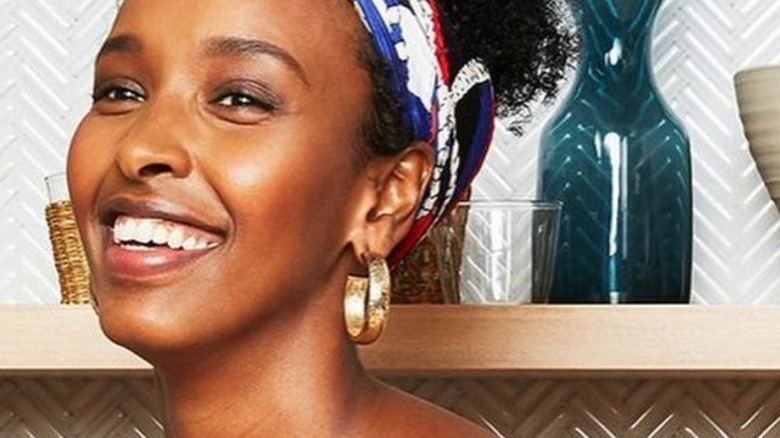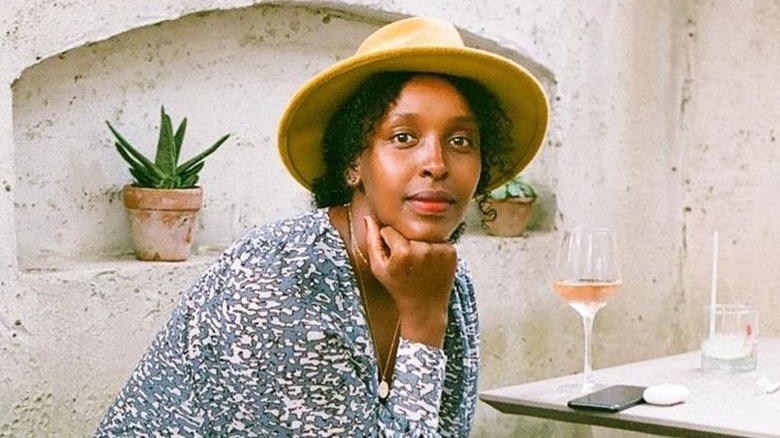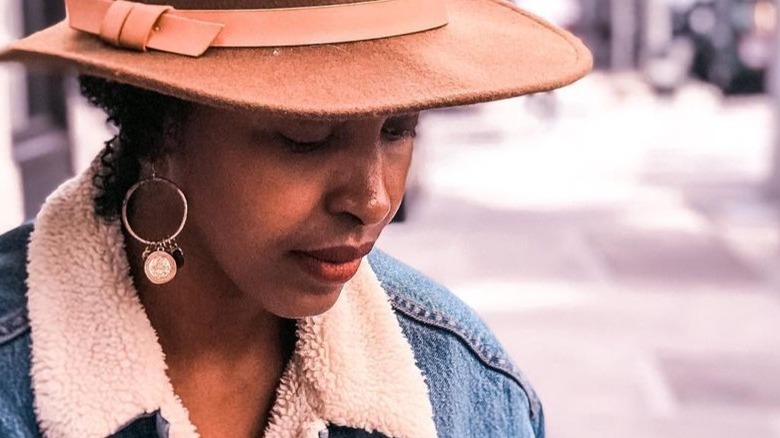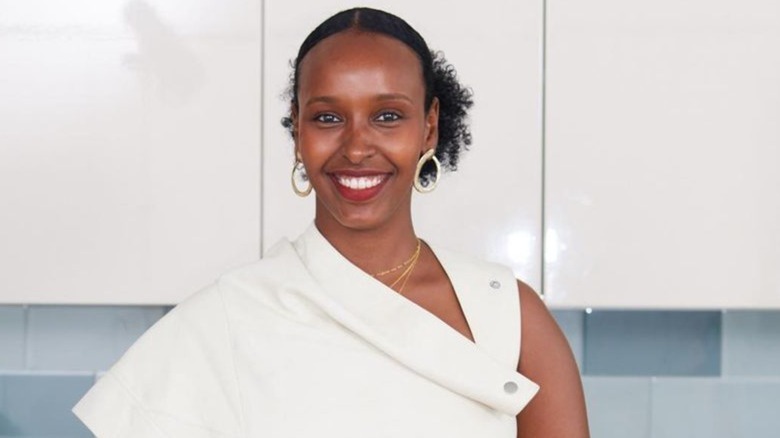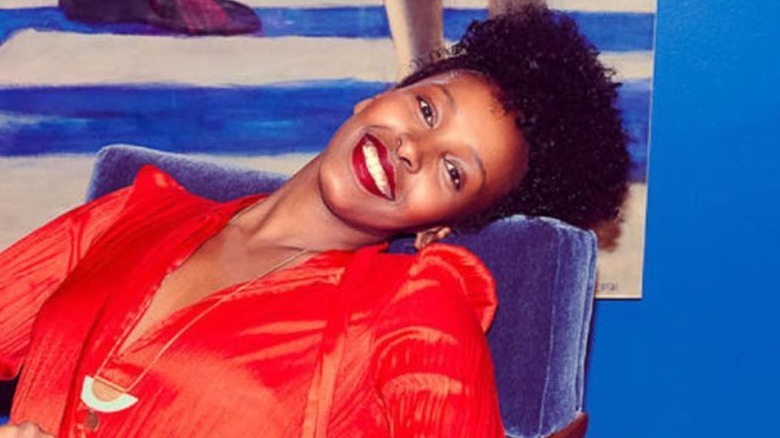The Untold Truth Of Hawa Hassan
Hawa Hassan has got a TV show on Food Network, "Spice of Life," and it's about time (via Food Network). You can go ahead and enter Hassan's story into evidence as proof of the fact that the United States can't limit itself to celebrating meatloaf meals made in white-picketed houses. Perhaps you recognize the chef from her digital series "Hawa At Home," in which Hassan brings traditional recipes from the continent of Africa. "I'm not generalizing African food," Hassan explained on Instagram. "I personalize my recipes and tailor them for what's fitting to my life and appetite."
Hassan has things to teach. Trust us. There are big things — like the fact that, for Hawa Hassan, perfection isn't an extravagance. It's simplicity. Her perfect day, she told Create Cultivate is "hanging in bed with my partner, drinking hot water with lemon, and going for a long walk." Then there are smaller, but nonetheless, life-changing skills that Hassan will teach you, too. For example, before getting to know Hassan's work we thought that Giada de Laurentiis or maybe even Guy Fieri were authorities on how to make good grilled cheese. Hassan, however, will show you how to make South African grilled cheese sandwiches (Chakalaka and Cheddar Braaibroodjies), which are traditionally cooked over open coals, and which will almost certainly bring new meaning to your meals (via Instagram).
Why Hawa Hassan stopped eating Somali food as a child
Hassan probably picked up her grilled cheese recipe while living in Cape Town (via Instagram). But Hassan's origin story will take you more than a plane ride away from South Africa. The Food Network personality has been a New Yorker since 2005, and it was only then that Hassan rediscovered her roots through the textures, flavors, colors, and smells of food. "By then, I was missing the idea of home and it being a place and the people that are my bloodline ... as a way to reconnect with that I started cooking it for myself," Hassan told Condé Nast Traveler. New York became Hassan's home by way of Seattle, where she moved when she was seven after a childhood lived in Somalia and a refugee camp in Kenya (via Vanity Fair).
As a young child in the United States, Hassan always thought her family would join her. By fifth grade, she understood that neither her parents nor her nine siblings (via The Kitchn) would ever be able to do so (via Instagram). In retaliation, she stopped wanting to remember her home through its cuisine. "There was a rebellious stage where I was, like, 'I reject all things Somali because these people who were supposed to take care of me never came,'" the entrepreneur and cookbook writer told Vanity Fair. It would take 15 years after settling into Seattle's South End to reunite with her family (in Norway). When she did, her days with them were filled with the kitchen.
Don't read Hawa Hassan's cookbook for the recipes. Here's why
Like eating Somali food again was never just about her palate, Hassan's cookbook, "In Bibi's Kitchen," is not really — not only — about recipes. It's an invitation to open your cooking routine to other cultures. "I wanted to introduce people to the cuisine of the continent of Africa. If I can get to their table, then they'll be interested in the larger picture," she told Vanity Fair. "The larger picture ... became the stories about where I come from—and what better way to do that than through grandmothers and recipes of just one country, but eight countries." In this way, the recipes in "In Bibi's Kitchen" are unique not just because of the regions they represent: but because they are imbued with the strength and beauty of matriarchy.
Hassan's cookbook is a continuation of the work she started with Basbaas Foods. The company, which sells "African-inspired sauces and condiments," is the result of not flavors but feeling. Hassan dreamt it up after her reunion with her family in Norway. "I spent so much time with my mom, her friends, and my sisters," Hassan reflected of the time on Instagram. "We were always in the kitchen cooking, laughing, and catching up on old times. I felt useful, comfortable, clear on my priorities and loved. It made all the difference in the world." If, as she told Vanity Fair, "being in kitchens with women" is a source of strength and joy for Hassan, these are the feelings that she passes on in all of her food-related work.
What Hawa Hassan thinks about Instagrammable food
Does it shock you to learn that Hawa Hassan, who herself is an ex-model, isn't social media's biggest fan? — at least not when it comes to pictures of food. "Food in the States — especially on social media — is all about the best picture, the most beautiful-looking recipe, the brightest turmeric cake," Hassan reflected to Kitchn. The food that Hawa Hassan wants to teach you how to make might not be photograph-friendly, but it will be true to itself. "In Bibi's Kitchen," is all about, per Hassan, "how these grandmothers really eat ... It's about being relaxed enough to let the food go where it wants to go, you know?"
If that's a thrilling concept, even more intoxicating is Hassan's rejection of everything "trendy." Cloud bread, frosés, everything-infused-with-matcha, cronuts, and sushi burgers may be hip and exciting (or may have been hip once, according to Delicious). But we'd be lying if we didn't admit that keeping up with fashionable food isn't also, sometimes as empty as it is exhausting. Hawa Hassan offers respite, and also substance. As the food connoisseur explained to Food 52, Hassan will never be one desperately trying to be at the forefront of "what's new and next." Instead, she's in the food industry to tell stories about people and cuisines that have existed for centuries, but have "just kind of been left out."
Why Hawa Hassan left her career as a model
This leads us to Hawa Hassan's past life profession. After graduating from high school at 16 and enrolling in Bellevue College (via Seattle Times), Hassan began a 13-year stint as a fashion model (via Condé Nast Traveler). Modeling allowed her to travel the world. In between graduating from high school in Seattle and founding Basbaas Foods, Hassan lived in Nairobi, Kenya; Cape Town, South Africa; and Oslo, Norway (via Kitchn).
But as soon as Hassan launched Basbaas in 2015, she gave up modeling for good (via Bon Appétit). In doing so, she seized control of a narrative that she'd had to let go of when working in fashion. "Anything that my agency and my bookers had placed on me, I ran with it, because the best thing that you can be as a model is to be a chameleon," she reflected to Condé Nast Traveler. "It's to be a girl who's Black, but can also pass for what they would say 'exotic,' as if a person is a fruit." Before founding Basbass, Hassan considered a career in the UN to — as she told Food 52 – "advocate for people who were part of the inadequate system," and particularly refugees. Founding Basbass was a way to do something similar. It not only let Hassan build her own identity but also tell the stories about her heritage and culture on "a positive note."
Inside Hawa Hassan's pantry
Your pantry is something that Hawa Hassan wants to talk about. What's in it is what determines how you cook, what you cook, and what stories and cultures you bring to your table on an everyday basis. Basbaas's sauces and condiments will fill your cupboards with memories of the Indian Ocean. "Warm spices like cardamom, coriander, ginger, cinnamon, and cloves do it for me," she told Bon Appétit. Cinnamon is especially significant to the Food Network personality. It reminds her, she told Vanity Fair, of her mother. And, Hassan further explained to Condé Nast Traveler, the smells of cinnamon and cardamom and cloves, and the "subtleness" and "sweet and savoriness" of Somali spices were sensations that Hassan longed for as a child in Seattle.
Today, her spice cabinet almost always includes the Somali spice xawaash, which is a mix of cinnamon bark, cumin, cardamom, black peppercorns, and whole cloves, and turmeric. "You can never use too much xawaash," she told Shape. "It will make your food slightly warmer." Berbere and hawaij are also everyday go-to spices for Hassan (via Kitchn). If you're unsure how to use them, "Spice of Life" is probably a must-watch for you.
On the other hand, here's one trick-of-the-trade you can begin implementing in your life immediately (and very definitely should). "I've been really inspired by coconut milk," Hassan told Kitchn "I like to soak my rice in coconut milk like my mom does — it softens the rice a lot, it helps it cooks faster, and it's fluffier. "
